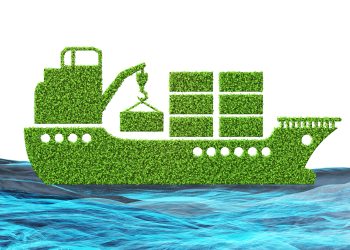As European shipowners align with the EU’s objectives for a greener future, Evina Fotiadou, Policy Advisor for Shipping Policy and Communications at ECSA, highlights the obstacles hindering the maritime industry’s transition. Notably, she points out the decline in shipping portfolios of European banks due to stringent capital requirements.
Evina underscores the necessity of incentivizing banks to finance industry transformation to cultivate an ESG-driven maritime culture. This entails implementing measures to bolster funding for energy transition and climate objectives, thus propelling Europe’s sustainability agenda forward.
SAFETY4SEA: When it comes to ESG and sustainability, what are the key priorities on the ECSA agenda for the next five years?
Evina Fotiadou: The shipping industry is a cornerstone of European security, especially of energy, food and supply chain security. To ensure that European shipping continues to play a strategic role and remains a leader in the international supply chains, we need to meet the challenge of the digital transition, match the uptake of clean fuels, and address the skills gap. At the same time, European shipowners are committed to contributing to the EU’s goal of becoming the first carbon-neutral continent by 2050, while thriving in the evolving landscape of ESG. Having these targets in mind, and ahead of the 2024 European elections, ECSA’s policy priorities for the next five years focus on 4 main pillars: Climate and energy transition, people-centred green and digital transition, ship finance and competitiveness and trade.
S4S: Do you believe the maritime industry is moving in the right direction? What do you see as the defining ESG/ sustainability trends driving maritime toward the future?
EF.: While Europe is facing an existential transformation towards climate neutrality, European shipping is also striving to support this transformation and move in the right direction. The Green Deal, and the Fit-for-55 Package are the two leading elements for a more sustainable sector. To achieve the 2030 climate goals and the net-zero by 2050, supporting the discussion on prioritising investments in low- and zero carbon technologies and fuels is essential. Additionally, the uptake of clean, safe and affordable fuels for shipping should be a clear priority in the near future.
S4S: How can we create the right culture and mindset for an ESG-fit maritime industry from your perspective?
E.F.: European shipowners share the EU’s ambitions to strengthen Europe’s security by fostering green technology manufacturing, green transport, a people-centered transition and open trade. However, a significant barrier for the ongoing transition is the decrease of shipping portfolios of many European banks due to stricter banking capital requirements. In order to enhance the ESG culture within the maritime industry, the banking sector should be incentivised to finance the transition of the industry. The prudential regulation should be reviewed and designed considering the distinctive features of shipping. Additionally, diversity of financing and funding tools as long as clear definitions of sustainable projects based on ESG would enhance the financing of the energy transition and climate ambition of the sector.
S4S: Where do you see the biggest opportunities when it comes to the human element of shipping’s decarbonisation journey?
E.F.: Seafarers are the backbone of the maritime transport industry, as they facilitate international trade, and connect nations across the seas. Under the ongoing green and digital transformation, future clean fuels, such as hydrogen, ammonia, batteries, and biofuels, will require new skills, education, and operational training for seafarers. Technologically advanced ships will also require new digital skills. Therefore, there is an immediate need for reskilling and upskilling seafarers. This need creates an opportunity to increase diversity in the industry and foster a more inclusive working environment. For a successful people-centred transition, the EU should enhance the collaboration between industry leaders, educational institutions, and organisations dedicated to diversity and gender equality.
S4S: How could industry stakeholders best collaborate in support of sustainable development? How is ECSA fostering collaboration and knowledge towards?
E.F.: European shipping competes on the global stage, meaning that it has to face global challenges. These challenges can only be addressed through coherent regulation at IMO level to ensure a level playing field at international level. For this reason, ECSA has welcomed the ratification of the IMO Hong Kong Convention on ship recycling and the historic IMO agreement of July 2023 to reach net-zero GHG emissions from international shipping by 2050. Additionally, ECSA believes that, to foster the decarbonisation of the sector, the production and availability of affordable low-and zero carbon shipping fuels is imperative. Therefore, we strongly advocate for the introduction of a mandate on fuel suppliers to produce these fuels in future revision of the Fit for 55 Package, while port infrastructures and energy hubs should also be developed.
S4S: Looking ahead, how can the maritime industry go the extra mile in addressing emerging ESG challenges?
E.F.: Supporting and prioritising investments in low- and zero carbon is essential for dealing with the environmental challenges. The dedicated envelope for the maritime sector under the Innovation Fund should be used as soon as possible to foster the transition and bridge the price gap between conventional and low-and zero carbon shipping fuels. Extra focus should also be given to the role of seafarers in the transition. The EU should continue to enhance and promote reskilling and upskilling of seafarers, in particular in view of the ongoing review and revision of the STCW Convention which is fundamental to succeed with the green and digital transformation of shipping at global level. Finally, having strong ship financing in Europe will benefit the European maritime sector and economy at large by enabling the development of innovative and sustainable solutions for shipping in Europe.
The views presented are only those of the authors and do not necessarily reflect those of SAFETY4SEA and are for information sharing and discussion purposes only.


































































